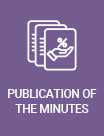Minutes for Banco de la República's Board of Directors Meeting on June 28, 2021
After a thorough evaluation of economic activity, inflation and international financial conditions, Banco de la República's board of directors (BDBR) voted unanimously on June 28 to hold the benchmark interest rate at 1.75%.
The monetary policy discussion centered on the following considerations:
After growth outpaced expectations in the first quarter, economic activity remained dynamic in April, growing at an annual rate of 29.2% in the seasonally adjusted and calendar-corrected series from DANE's monthly economic tracking indicator (ISE, by its acronym in Spanish). A low basis of comparison from 2020 had a significant impact on this result, which exceeded the same figure from March by 0.3% despite new mobility restrictions in some cities in response to additional outbreaks of COVID-19.
A third wave of the coronavirus and, in particular, roadblocks and other disruptions to public order will likely be reflected in a deceleration of economic growth in the second quarter. However, the economic recovery observed through April led the Bank's technical staff to increase its growth forecast for 2021 from 6% to 6.5% in the central forecast scenario. Even in this case, GDP would be expected to remain below 2019 levels this year. Meanwhile, recovery in employment has slowed and unemployment rates and levels of informality remain high.
Annual inflation in May exceeded projections at 3.3%. Upward pressures came primarily from foods (9.52%), especially perishable foods (18.16%), as the result of supply challenges in multiple cities. Inflation on regulated items also accelerated (4.2%) due to the partial lapse of price relief measures on utility rates put in place in 2020, as well as due to an increase in fuel prices. Core inflation excluding food and regulated items (1.56%) remained below the target and was similar to projections. Some inflationary pressures from May could show a degree of persistence, which could keep annual inflation above the target until the first quarter of 2022. Such persistence would be the result of the time required to re-establish production affected by the roadblocks, as well as an increase in international food prices and high logistics and transportation costs. Expected inflation, which remains anchored to the target, could be affected by this scenario.
The BDBR observed that growth in foreign demand has been higher than expected, leading to increased dynamism in the trade of goods despite deteriorating value chains and a significant increase in raw materials prices and freight costs. Although foreign demand and terms of trade have improved, the 2021 forecast for the current account deficit has been revised upward. This comes in line with greater dynamism in domestic demand, reflected in increased imports and an increase in the earnings that businesses with foreign investment in Colombia send abroad.
The BDBR considered the possibility that the U.S. Federal Reserve may bring forward the normalization of its monetary policy in response to unexpectedly high inflation and the persistence of inflationary pressures. If this were to occur, international financial conditions could become less favorable and the risk appetite for investment in emerging markets could be affected. The space for Colombia to maintain a monetary policy as expansive as the current stance could be limited in these circumstances.
The BDBR reiterated its view on the need for an adequate fiscal adjustment as a necessary condition for the public sector to maintain access to financing at reasonable costs. Should this fail to occur, the space for monetary policy to continue supporting recovery in economic activity and employment would eventually be reduced.
In their policy discussion, the board members agreed that Colombia's current macroeconomic scenario is changing in a highly uncertain environment. As the economy recovers and excess capacity is reduced, the labor market continues to be loose and inflation has increased. However, the board members emphasized that a large part of the increase in inflation in May came as the result of a supply shock, as suggested by the fact that the average of the indicators of core inflation remained below the target rate. One member of the board expressed surprise that inflation in the basic family basket remains so low despite the fact that installed excess capacity is decreasing and that global commodity prices are rising. The member raised the possibility that this could change in the months ahead. Another board member noted that disruptions in the supply chain both domestically and internationally could take time to normalize, which in the meantime would affect production costs. The monetary policy challenge under these conditions is to avoid stagflation.
Given that expected inflation remains anchored to the target, the board members concurred in holding the benchmark interest rate, subject to developments in the months ahead and keeping a close eye on the evolution of fiscal and external financial conditions.
The board members also noted that the expansive monetary policy stance adopted last year has been transmitted to a large degree on distinct credit modalities, and that in some cases interest rate reductions have even exceeded changes to the policy rate. As was to be expected, this has been tempered to some degree by an increase in perceived risk on the part of some financial agents. As a result, a more effective transmission of the relaxation in monetary policy has been limited in some specific cases, such as in microcredit. One board member expressed concern over the insufficient level of financing being received by the private sector, and the degree to which increased public financing needs could be displacing private financing.
Finally, the board members examined the recent evolution of the exchange rate and concluded that idiosyncratic factors, including a credit downgrade from one ratings agency and uncertainty related to recent social unrest, have influenced its performance. The board members noted, however, that an improvement in the terms of trade and, especially, an increase in oil prices have mitigated downward exchange rate pressures. Given the potential for less favorable international financial conditions in the future, they reiterated the need for fiscal adjustment as a means of providing greater assurance on this front.














.png)

































